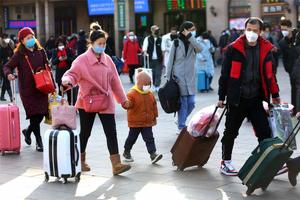 Passengers wearing face masks arrive at the Beijing Railway Station in Beijing on Jan 30, 2020. (ZOU HONG / CHINA DAILY)
Passengers wearing face masks arrive at the Beijing Railway Station in Beijing on Jan 30, 2020. (ZOU HONG / CHINA DAILY)
People who hide the fact that they have traveled or lived in regions where the novel coronavirus outbreak has taken hold will be held responsible, and may even face criminal charges, in Guangdong province, according to new guidelines.
Moreover, those who are aware that they probably or definitely are infected with the virus but do not report or seek medical treatment will also be held responsible, even criminally.
Moreover, those who are aware that they probably or definitely are infected with the virus but do not report or seek medical treatment will also be held responsible, even criminally
The committee for comprehensive governance by rule of law under the Guangdong Party committee issued the guidelines on Tuesday.
As the top public health emergency response system has been triggered in the province, the guidelines are meant to further facilitate administrative law enforcement.
Those who need to be quarantined or require medical observation but refuse to fully comply will be put under mandatory treatment or observation with assistance by the police.
READ MORE: New suspected infections decrease for second day
The guidelines also address people not wearing masks in public venues; disruption of order in public venues and public vehicles; rumor fabrication and transmission; the production and selling of fake goods; and failure to comply with rules on school and enterprise reopenings.
The guidelines are necessary because of new situations arising from the epidemic, such as the need for protective gear and the fact that some people try to conceal their traveling in places hit by the outbreak, said Yuan Wuqiang, chief director of the Zhengzhou branch of Beijing Bairui Law Firm.
Both law enforcement personnel and the general public lack experience and rules to guide them, Yuan said.
Some organizations and individuals are unaware of the consequences of their conduct. With the SARS outbreak now 17 years in the past, some people and organizations are not paying enough attention to epidemic control. It is necessary to clarify the nature and consequences of related conduct and law enforcement measures, Yuan said.
Meanwhile, police in Shenzhen, Guangdong, launched on Tuesday the investigations of a man and a woman who violated epidemic control rules and are suspected of the crime of endangering public safety.
Throughout her medical treatment process, the woman, a confirmed novel coronavirus case, hid the fact she traveled on Jan 21 from Wuhan, Hubei province-the epicenter of the outbreak-to Shenzhen.
She did not wear any protective gear in public vehicles and public venues after she arrived in Shenzhen.
The man, who drove from Qianjiang in Hubei to Shenzhen on Jan 26, did not stay indoors after signing a promise to stay in quarantine and check his body temperature daily.
He cheated interviewers by hiding his traveling record, activities, and fever and cough. He was confirmed as infected with the novel coronavirus.
ALSO READ: US drug with potential to treat virus in clinical trials in Wuhan
Similar investigations are ongoing in other parts of the country.
In Jinjiang, Fujian province, local authorities announced on Wednesday that a person surnamed Zhang has been criminally detained after Zhang ignored a local health department's order of in-house quarantine after returning from Wuhan and attended gatherings and a wedding.
Eight confirmed and two suspected cases are linked to Zhang, with more than 3,500 people who attended these gatherings under watch.
In Changchun, Jilin province, police on Tuesday started an investigation of a man who did not quarantine himself after traveling from Wuhan. During medical treatment, he hid the fact that he had worked in Wuhan for a long time and had recently traveled from there.
The man had close contact with other people, leading to the infection of five people and the quarantining of many others.


